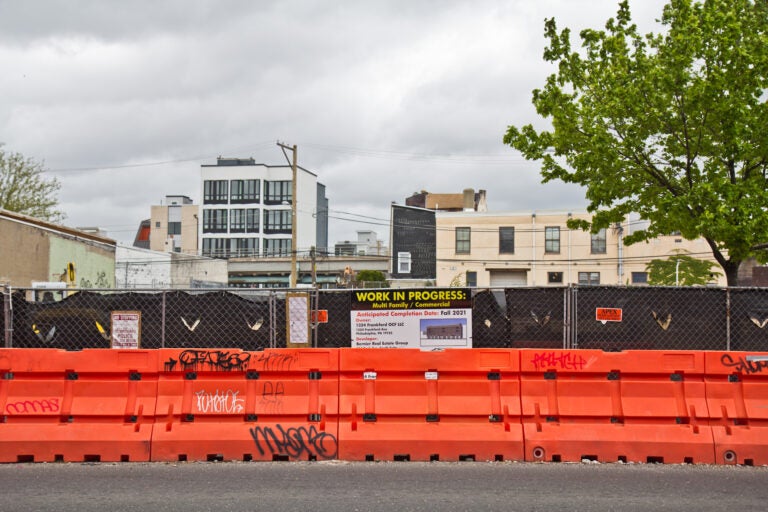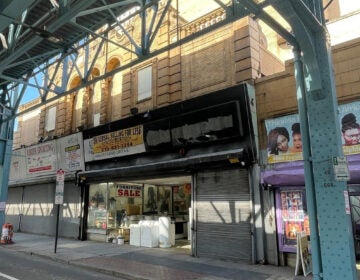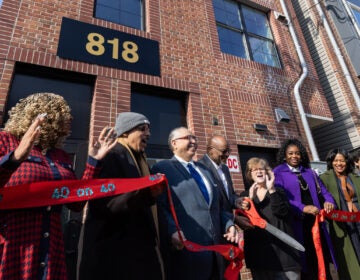This election reveals why Philadelphia’s neighborhoods need a construction impact tax
A construction impact tax could support small businesses, job growth and affordable housing for those who need it the most in Philadelphia.

Construction at 1324 Frankford Avenue in Fishtown. (Kimberly Paynter/WHYY)
City Council expects to soon consider two pieces of legislation that would fund a $400 million bond issue to invest in affordable homes, neighborhood commercial corridors, and create jobs.
The first bill would create a Construction Impact Tax (CIT) of 1% on the cost of all construction. Council staffers project such a levy would generate $20 to $26 million annually — revenue for the city that would come from builders and developers. With that new cost in mind, Council has also proposed a second piece of legislation that would delay implementation of reforms to the 10-Year Tax Abatement until January 2024. The legislative package means that developers building after January for the next three years will work with an abatement that is about 90% as valuable as the current abatement, instead of half as valuable as the reform legislation passed in 2019 would have it. The math reflects the proposal to leave the full 10-year abatement on the assessed value of all improvements unchanged, minus the 1% Construction Impact Tax, which typically amounts to about a year’s value of the abatement. The CIT would not expire at the end of the three years however, and would be in place permanently unless Council adopts additional legislation.
The proposal would use dollars raised from the CIT to pay the debt service on a $400 million bond, supercharging investment in activities often performed by community development corporations (CDCs) that create jobs and economic activity. Research recently conducted by Econsult showed that over the last 28 years, CDC activity building and repairing affordable homes, fixing up neighborhood commercial corridors, and similar work delivered $5.4 billion worth of economic impact in Philadelphia. That work created 12,790 jobs, and boosted property values by $2.4 billion. But most important is for whom: This activity served some of our lowest-income neighbors, our smallest businesses, and in neighborhoods that the private market often doesn’t serve.
A $400 million bond could mean small businesses along our neighborhood commercial corridors — from North 5th & Lehigh, to Germantown Avenue, to 52nd and Market — could get resources to fix up the insides and outsides of their stores, making them more attractive to potential customers. It means we could buy vacant properties on our corridors, fix them up, and boost ownership of property and businesses for people of color in our neighborhoods, instead of absent and out-of-state investors.
The bond would also fund affordable homes, including new construction rental and for-sale homes on vacant lots that are magnets for short-dumping and other illegal activity, as well as repairs to existing affordable homes to make them safer. Seniors could get help to make their homes more accessible and to remove tripping hazards. Lower-income homeowners that have been unable to make critical repairs could get new roofs, heaters repaired, and the plumbing leaks fixed.
If Congress approves any additional stimulus dollars for communities like Philadelphia, we would be able to leverage those funds with the local dollars raised by the CIT to have an even bigger impact. But as the election Tuesday revealed, we can’t wait to see if Washington will act. We need to make investments in our neighbors and their future to begin the COVID recovery now.
The good news is that the City of Philadelphia and our CDCs already know how to make these investments because we’ve been doing them for years. But the bond funds would allow us to double or triple that activity over the next four to six years, creating jobs for community residents by serving critical needs of low and moderate income Philadelphians. That’s what equitable development means, and what an equitable recovery should look like.
City Council and the Kenney Administration should add three things to the proposal to ensure it lives up to the promise of contributing toward an equitable recovery:
First, an advisory committee with strong community representation should be created to guide decision-making on how the funds will be spent, as well as make regular reporting to the public on investments, job creation, and equity goals.
Second, at least 25% of the funds should support activity on our neighborhood commercial corridors where businesses have been devastated by the pandemic.
Third, Council and the Kenney Administration should negotiate with the building trades unions to lower the cost of construction for projects supported by these funds so public dollars can be stretched further to meet more community needs. Council has already pushed for hiring goals that give access to construction jobs for people of color and local residents, which PACDC strongly supports.
For Philadelphia to recover from the economic devastation brought by COVID, we need this local investment to create jobs and improve conditions in our communities. And it must be done equitably, so that people of color who have suffered the most from both the economic and health disparities laid bare by COVID see measurable benefit in their lives and neighborhoods.
Maria Gonzalez is the President of HACE and Board President of the Philadelphia Association of Community Development Corporations (PACDC) and Majeedah Rashid is the Chief Operating Officer for Nicetown CDC and the Board Vice President for PACDC.

Subscribe to PlanPhilly
WHYY is your source for fact-based, in-depth journalism and information. As a nonprofit organization, we rely on financial support from readers like you. Please give today.







